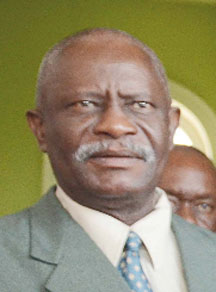The main opposition APNU yesterday signaled that it would push for the government’s proposed amendments to the anti-money laundering laws to be examined by a parliamentary select committee, in order to get political consensus and ensure what is passed is right for the country.
On April 22nd, government tabled the Anti-Money Laundering and Countering the Financing of Terrorism (Amendment) Bill 2013, specifically to meet a May 27th deadline to implement Financial Action Task Force on Money Laundering (FATF) recommendations to address weaknesses in the Act and related legislation.
“Any complex legislation, especially one with far reaching effects of this kind, should go automatically to a parliament[ary] select committee and we hope that in fact that procedure is followed… you don’t rush legislation that is so important without the benefit of good parliamentary scrutiny,” APNU Executive Member Lance Carberry told a press conference, when asked if the select committee process could see Guyana missing the deadline for implementing the recommendations.
Although the bill is due to come up for debate next Tuesday, when the National Assembly reconvenes, Carberry opined that the bill should go to a select committee for analysis and possible consensus before the deadline. “I could tell you from my own experience in parliament that select committees act very quickly if the information that they require is provided in a very expeditious manner,” he said.

APNU’s Shadow Minister of Home Affairs Winston Felix informed that the coalition would consult with both the PPP/C and AFC before making a decision on support for the bill. “We are very clear in our expression that because of the complexity of this bill, it must go though the rigors of a parliamentary sub-committee… where it undergoes scrutiny… The question of support now would be premature until we can come together, discuss it, flesh it out and then come up with what we think is right for Guyana,” he said.
Though not addressed in the amendment bill, one area of concern for APNU is the fact that the Director of the Financial Intelligence Unit (FIU) was solely appointed by the Minister of Finance and could only be dismissed by the President. This, they coalition said, raises questions about its independence of political influence. “Once he [the FIU Director] is appointed by a Minister of Finance and could only be dismissed by the President… then we know that independence is illusory,” said APNU MP and Shadow Minister of Legal Affairs Basil Williams. “We have to put the system together, the police, the FIU, the lawyers, the auditor, etcetera into a team … It is not a one man investigation,” he added.
Felix, meanwhile, reiterated his concerns about a lack of enforcement of the law, which he had raised when the amendment bill was first tabled. “We have noted over the years that precious little has been done to implement the money laundering act… we see visible indicators of enormous spending, which … has enough grounds upon which an investigation can be launched yet we see nothing,” he said.
He explained that during his tenure as Commissioner of Police, the FIU was in its infancy and there was not enough support for the Guyana Police Force to enforce laws. “The issue here is capacity to do the investigation. You need to build capacity. It’s pointless going after the investigations and you meet roadblocks as a result of lack of capacity,” he said.
The last FATF evaluation of Guyana, which is a member of the Caribbean FATF, found that while authorities have started to comply with some of its recommendations, the measures taken remained minimal.
Among other things, the bill seeks to widen the reach of the law by including concepts such as “beneficial ownership” (to identify persons who ultimately exercise ownership rights in legal entities) and widening definitions, such as the “proceeds of crime” (to include indirect gains), “property” (to include electronic or digital evidence) and “terrorist financing” (to include funds whether from a legal or illegal source), in order to aid prosecutions.
According to the bill, the amendments propose to increase the minimum fine upon conviction for certain money laundering offences from $1 million to $5 million, the insertion of a new section to provide for the freezing of funds of terrorists and terrorist groups or organizations and widening the scope of the Financial Intelligence Unit (FIU) to request information from telecoms providers.
The amendments also seek to expand due diligence obligations of reporting entities. One of the amendments would provide for reporting entities not to open new accounts or conduct business when it is unable to obtain a satisfactory evidence of the identity of the intended customer and to consider making a suspicious transaction report. And, where a customer becomes “politically exposed”—either directly as a functionary of the government, state, judiciary, military, important political party, or indirectly as a family member or close associate of such a functionary—the senior management of a reporting entity would have to green-light continued business relations.
The bill also makes provisions for amendments to the Gambling Prevention Act; the Mutual Assistance in Criminal Matters Act; the Securities Industries Act; the Money Transfer Agencies Licencing Act; the Foreign Exchange (Miscellaneous Provisions Act); the Co-operatives Societies Act; the Companies Act; and the Insurance Act.





